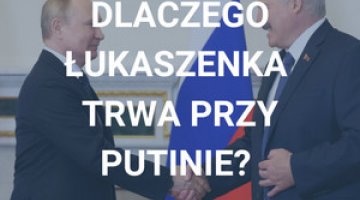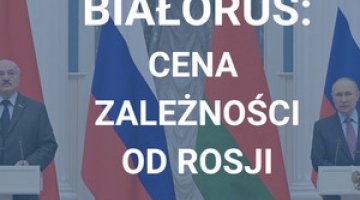The legalisation of terror. The Belarusian regime expands the legal basis for repression
In recent weeks, the Belarusian regime has taken legislative steps to create a legal framework for the further escalation of repression against opponents. On May 14, Alexander Lukashenka signed a law on preventing the rehabilitation of Nazism and an amendment to a law on countering extremism. Then, on May 17, he approved amendments to the law on national security and on additional legal protection for state officials (including judges) and journalists from the state-run media. Additionally, there are also amendments regulating (among other things) the rules of public gatherings, the work of the media, and some which redefine the right to strike and personal data protection which are still awaiting the President’s signature. The decision on such a far-reaching reform of the legislation was made on January 28, when Lukashenka deemed the existing standards too ‘liberal’ In his opinion they had been used by the people organising mass protests against the rigged presidential election of August 9, 2020. The regime, after successfully suppressing post-election demonstrations, has thus proceeded to legally sanction the terror of an oppressive police state, seeking to significantly increase its control over society. The regulations currently being implemented not only lead to further restrictions on civil liberties, but also consolidate the omnipotence of the already influential security structures, which play a key role in shaping state policy towards society.
More freedom of action and guarantees of impunity for the “siloviks”
The legal acts strengthening the regime of the police state comprise three laws signed by Lukashenka: “On amendments to acts on guaranteeing national security”, “On the protection of personal data” and “On state protection of judges, officers and officials of law enforcement agencies and employees of a state protection body”.
The first of them introduces a number of changes in the regulations on the functioning of all state security bodies (KGB, the MIA, the internal military formations of the MIA, the border guard and customs service). The most important change is the extension of the right to use firearms and other means involving the use of force, as well as allowing the use of objects that do not belong to the standard equipment of security bodies against those who resist. The law does not specify the list of such objects, but it may be presumed that these are, for example, baseball bats. From now on, the use of weapons and special means is possible against persons committing administrative offences (i.e. acts of minor harm), but will often be connected with participation in protest actions (e.g. displaying national symbols banned by the authorities). One other regulation that may encourage the abuse of the right to use weapons and other special means is the provision on the lack of liability of officers and soldiers for the losses or damages they cause. Provisions have also been introduced to limit access to information about the activities of departments responsible for state security. This is partly due to the need to protect state secrets or personal data. As a result, officers will be anonymised, and the disclosure of their personal information by third parties will be subject to criminal prosecution. The law also specifies that the security authorities have an unlimited right to conduct surveillance on persons suspected of intending to commit a crime or offence, including obtaining data from operators without the consent of the prosecutor’s office or court.
The legislative changes introduced have decisively strengthened the KGB’s position as the department which coordinates activities, including the suppression of possible public protests. According to the new regulation, the KGB (with the president’s consent) may use the forces and resources of the Armed Forces of the Republic of Belarus, the border guard Service, the MIA, the MIA’s internal military formations and other bodies responsible for state security.
The extension of the powers of the state power departments in this sphere is confirmed in the law “on the protection of personal data”. It also takes into account the special role of the Operations and Analysis Centre under the President of the Republic of Belarus (a special service responsible for the functioning of the national Internet domain .by and monitoring the Belarusian Internet space). This has been given the power to obtain all data on persons using these services from telecommunication service providers.
In turn, the law on the protection of public officials introduces the possibility of extending protection to officers and officials of institutions and, if necessary, their families, whose physical safety may be threatened due to their participation in the fight against crime. Protection, including the possibility of changing one’s external appearance, will be carried out by the President’s Security Service and the KGB or MIA. These regulations are another example of solutions aimed at marking out security and law enforcement personnel as an elite group guarding the regime and under special state protection.
Aggressive politics of memory
The law on preventing the rehabilitation of Nazism introduces new mechanisms for Belarusian legislation to combat attempts to “undermine or relativise” the crimes committed against the Belarusian people during World War II by the Nazi occupiers. The definition of Nazism and Nazi symbolism worded in the law allows for the use of these terms not only to refer to military or police units of the Third Reich, but also to other formations operating at that time on the territory of Belarus. This line of interpretation was indicated by the prosecutor general of the Republic of Belarus Andrey Shved, who on May 17 announced the initiation of proceedings against the surviving soldiers of the Home Army and Lithuanian formations collaborating with the Germans, who, in his opinion, should be punished for war crimes. This leads us to believe that the new regulations will serve, above all, to discredit Poland and, to some extent, Lithuania, as countries which allegedly strove to destroy the Belarusian people in the past and are now striving – by seeking EU sanctions – to derail Belarus and collapse its economy. This mainly anti-Polish propaganda is accompanied by an information campaign in the state media, which presents the entry of the Red Army into the eastern provinces of the Second Republic on September 17, 1939 as “an act of historical justice” leading to the unification of the Belarusian lands. It cannot be ruled out that the anniversary of this exact event will become a new national holiday – the Day of National Unity.
Action taken in the symbolic sphere translates into non-symbolic repression against the Polish minority. Since March this year, four members of the leadership of the Union of Poles in Belarus have been detained, including its chairwoman, Anzhalika Borys. The activists are accused under Article 130 of the Criminal Code, concerning, inter alia, the “rehabilitation of Nazism”, for which they face 5 to 12 years of imprisonment. This is also how the authorities interpreted the celebrations which the union has organised for years to commemorate the members of the Polish independence underground who were active in the territory of present-day Belarus. This example shows that the law passed in May will make it possible to shut down any organisation if its initiatives are interpreted as “promoting Nazism”. This means increased pressure not only on Polish organisations and schools, but also potentially on the whole Belarusian third sector.
Similarly, the law on counteracting extremism, in force since 2007, was also amended. It defines extremism as “anti-state” activity aimed at the “illegal usurpation of power” or “overthrowing the constitutional order”. In this case, too, very broad and generally formulated criteria were applied, allowing for the liquidation of any organisation or company (along with a ban on the use of its logo/symbolism) if it is deemed “extremist”.
Increased price of protest
Significant regulations limiting the right which citizens have to public forms of protest are awaiting the president’s signature. The amendments to the law “on public gatherings in the Republic of Belarus” (among others) prohibit journalists from reporting on an event that has not received permission from the authorities or is held in violation of the law. The ban on reporting on an assembly before the granting of a positive decision on the application for its organisation was also maintained. This provision had been abused by the authorities in recent years; they registered opposition events shortly before their date, causing fewer participants to attend. Amendments to legislation on media activities have also been prepared. The new solutions tighten the conditions for obtaining accreditation from the Ministry of Information, and empower the ministry and the prosecutor’s office to block the activity of a newspaper’s editorial office or Internet portal without a court decision, for example on suspicion of “disseminating extremist content”. The authorities will thus have even more legal instruments to close or suspend the activity of media organisations inconvenient for the regime, as happened on May 18 this year in the case of the most popular website, tut.by.
The reference to extremism in relation to the media indicates the key significance of this concept in the regime’s definition of threats to the stability of Belarus. This is evident in the context of the planned changes regarding the right to strike. The amendments to the labour law passed by the parliament actually prohibit the organisation of politically motivated strikes, reducing them to disputes over working conditions and salary levels. The possibility of the disciplinary dismissal of employees who organise or participate in illegal strikes has been extended. The tightening of labour laws came in response to numerous attempts to hold a strike by employees of state-owned enterprises across the country in the first weeks after the rigged elections on August 9 last year. At that time, the regime primarily sought to pacify protest sentiments among workers previously seen as part of Lukashenka’s permanent electorate.
Towards a hard dictatorship
The changes in the law implemented by the authorities do not create a completely new quality in the authoritarian model of how the state is governed. Even before the amendments, the regime regularly violated human rights and civil liberties. The new regulations reflect and legally sanction the evolution of Lukashenka’s dictatorship into an oppressive police state, based primarily on the power of influential security bodies to enforce obedience from citizens. At the same time, it is worth noting the unprecedented position of the KGB, which has become a true centre for coordinating the activities of security bodies at the operational level. Belarus is becoming increasingly confrontational in relations with the West, especially towards neighbouring Poland and Lithuania; this was reflected in the law on preventing the rehabilitation of Nazism, which was written exclusively for propaganda purposes. The tightening of regulations governing the social activity of citizens and the strengthening of the internal security sector indicate that Lukashenka, who is isolated in the West, is determined to hold on to power even at the cost of ruthless terror against alleged or imagined opponents.





